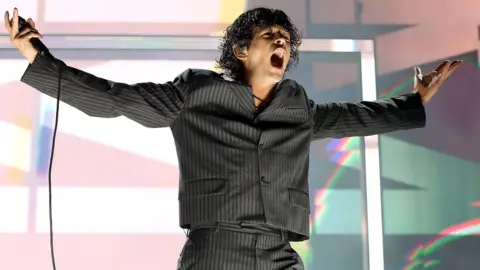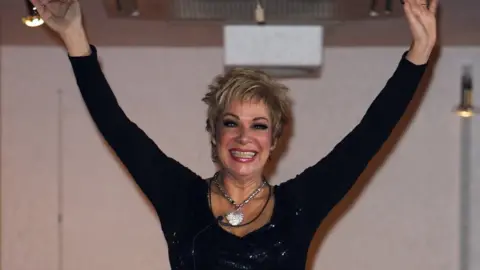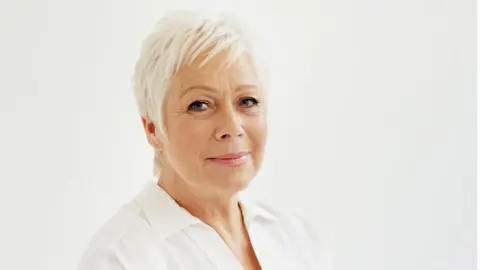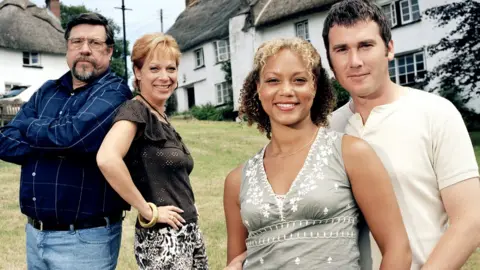Denise Welch shares her mental health survival tips
Denise Welch is worried about our collective mental health.
"Mental health services are going to be on their knees," says the actress and Loose Women star, amid the uncertainty of the coronavirus pandemic.
"We're talking about a possible second wave - it's going to include mental health, and undiagnosed mental illnesses of other kinds."
Psychiatrists warned last month of a "tsunami" of mental illness from problems stored up during lockdown.
Welch, 62, is no stranger to mental illness, calling it her "unwelcome visitor".
Her first depressive episode was sparked in 1989 by the birth of her son Matthew (now the frontman of The 1975), and she's spoken out about her debilitating mental health struggles and addictions ever since. She's also said she wished there was more information and medical help available during the early years of her illness.
 Getty Images
Getty ImagesThree marriages, two children and one viral video later, she has written a book documenting the pain she's experienced, and how she and her family have survived.
The book was prompted by the massive response she got after she "very impulsively" tweeted a video of herself during an episode of clinical depression.
Allow X content?

"I was overwhelmed, blindsided by the response, because I've talked out about this for 31 years, so it was actually a shock to me that so many people seem to be desperate to hear what I have to say about my illness," she tells BBC News.
Welch, whose acting roles include Waterloo Road, Coronation Street and Soldier Soldier, admits she's "somebody who is very sensitive and tends to take on the worries of the world".
She says of the coronavirus pandemic: "It's been a very frightening time for everybody, and some people have dealt with that better than others."
 Getty Images
Getty ImagesShe's quick to add that "obviously, I don't come at this as any kind of medical person", but having chatted with friends, young people and mental health charities, she's seen people with anxiety fall into two camps during lockdown.
"There were people who went into massive anxiety early on because of lockdown - people were unsure about their jobs, but mostly because of health anxiety," she says.
"But I was also talking to a lot of young people, and they found a solace in it, because of a lack of status anxiety in lockdown.
"A lot of young people live their lives in a 'compare and despair' world, and [suddenly] that didn't exist."
 Getty Images
Getty Images"Other people can't work, or they find it very difficult to, so the fact that many people weren't able to work has given some people a little comfort bubble."
"With lockdown starting to ease a little bit, we're now dealing with massive strains on the mental health service, because those people are now getting anxiety."
She worries for her many friends in the theatre industry, saying: "They are not just losing their jobs, they're losing their careers. And I've found that I've got a bit overwhelmed by that."
So, given her own history of anxiety and depression, what advice does she offer to people dealing with similar feelings?

Denise Welch's mental health survival tips
 Hodder and Staughton
Hodder and Staughton1. Allow yourself to be overwhelmed
"What I've found that for my own sanity, is that I've had to take some time in the day to allow myself to become overwhelmed with the worries of the world. It's not just the worries about family, it's the whole globe. "
2. See what you can do to help others
"I do what I can in little bits, whether that's making a video for somebody or just checking in on somebody, or tweeting. There's a hashtag #ExcludedUK on Twitter and it's about all of those freelancers who haven't got any money.
"So if you have got a job, maybe take a little bit of time each day to see what you can do to help others, even if it's just social media awareness."
3. Be a bit selfish
"I think that we have to protect our own mental health and be a bit selfish
"I have to look after my family and make sure that they're okay... but if I want to go upstairs and take some time out and have three hours watching The Real Housewives of anywhere in the world, I'm not going to feel guilty about it.
"I think that self care and retreating into your little bubble - it's not to be pooh-poohed. That's basically how I've managed to survive."

Welch has also spoken many times on the panel of ITV's Loose Women about mental health, and discussed her post-natal depression on breakfast TV with Lorraine Kelly.
She writes in her book: "Post-natal depression is the cruellest, most unforgiving and isolating condition, because not only are you submerged in a pitch-black nightmare of mental illness, but you also have a totally dependent child who can't survive without you."
She adds that when she first got ill, "I would have given anything to see a woman come on the television and talk about having my illness.
"Someone who was well, who had a couple of children and could smile and say, 'I've been where you are right now. But look at me now. Yes, I still have it, but in between I live this great life with my two children. You will get better."
But despite having spoken publicly about her condition in the past, it was still a "big decision" to write the book, which spares no details on her life.

"Much as I was frightened about writing it, because I knew it would be triggering, I knew I would have to really invest in order to write a really good book, something I was proud of."
She was also wary of press interest in some of the book's revelations, saying: "Anything to do with alcohol and drug use always creates a tabloid headline dream for them, you know?"
But she went ahead because: "I wanted to write the book that I needed throughout my illness.
"And that's what I feel that I've written. If I die tomorrow, I feel that this is my legacy and I'm happy with that.
"I honestly feel that this book is the book that I would have given anything to read when I needed it."
The actress is keenly aware that her writing might reach a different audience than other memoirs that tackle mental health.
"I think it's important there's different types of people, so for example, people like Stephen Fry and Ruby Wax have done wonders for the mental health world.
"But my audience tends to be a bit more 'Betty from Bolton', who wouldn't necessarily look to people who they see as being Oxford-educated people, because they feel that they wouldn't relate to them.
"So I am more relatable to a certain group of people, because of the type of TV I do, and I'm a Loose Woman. It's important that there's somebody for everybody."
 PA Media
PA MediaShe adds that a chapter in the book is written by "my husband, my dad, my sister, my sons and my best friends - because the people who live with those with depression are very under-represented".
"I always used to say that if the shoe had been on the other foot, and I was living with me, I don't know how tolerant I would have been. And so I'm very, very grateful for the people in my life."
Despite aspects of her life being having been blighted by depression, the star remains upbeat.
"I still say that if all the world's problems were in my front room in piles, I would still pick my pile, because my life outside of my depressive episodes is wonderful."
The Unwelcome Visitor: Depression and How I Survive It by Denise Welch is published by Hodder & Stoughton on 25 June.

Information and advice
If you or someone you know is struggling with issues raised by this story, find support through BBC Action Line.
